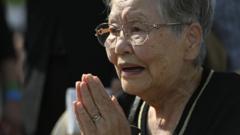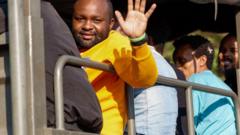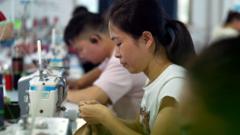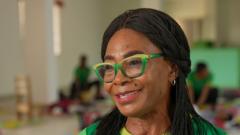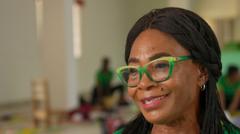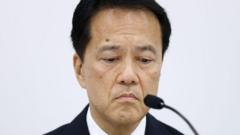Eighty years after the Hiroshima bombing, Korean survivors like Lee Jung-soon and Shim Jin-tae live with the physical and societal scars of their experiences. Little acknowledgment has been given to the Korean victims—a plight compounded by systemic discrimination and a lack of governmental support. As their stories resurface, they urge for remembrance and justice, reminding us of the profound impact of war on every life touched.
Forgotten Victims: The Untold Story of Korean Survivors from the Hiroshima Bomb

Forgotten Victims: The Untold Story of Korean Survivors from the Hiroshima Bomb
As the world remembers the horrors of Hiroshima, Korean survivors bear a unique and shrouded trauma, struggling for recognition and justice decades after the nuclear atrocity.
At 8:15 AM on August 6, 1945, an atomic bomb dubbed 'Little Boy' fell on Hiroshima, forever altering the lives of around 140,000 Koreans who were then residing in the city. Lee Jung-soon, now 88, recalls the chaos of that fateful day as she ran to school, interrupted by her father's urgent call to evacuate. Weaving her hands, she expresses the shock from witnessing devastation that would take decades to process: "I just cried and cried."
The bomb's terrifying aftermath left a trail of altered lives, especially for Koreans who were already marginalized under Japanese colonial rule. They constituted about 20% of the immediate victims of the blast, and many were subjected to forced labor that bore misfortune on that harrowing day. Survivors like Shim Jin-tae, now 83, highlight the grim reality: "Korean workers had to clean up the dead," pointing to the widespread fatalities given their precarious positions—often in the hardest, most dangerous jobs.
For many survivors, the effects of the atomic tragedy extend beyond their own health. Ms. Lee endures several chronic conditions linked to radiation exposure, but significantly, her son, Ho-chang, also battles kidney failure, which he fears is a consequence of their shared history. Complications in proving this generational link have led to ongoing struggles. The Ministry of Health and Welfare in South Korea has launched genetic studies to assess these connections, yet many remain frustrated by the ongoing wait for recognition.
While approximately 23,000 Korean survivors returned home post-war, they were met with prejudice, often labeled as cursed or disfigured owing to their visible scars. Survivors like Ms. Lee witnessed the bitterness and trauma as they were cast away by both society and family, struggling silently with illnesses attributed to their past but lacking formal acknowledgment.
Second-generation survivors, such as Han Jeong-sun, face their own battles with health issues and stigma within their families. Han's struggles demonstrate the painful offspring of these shadows, as she recalls her son's lifelong disability and the derision she faced from relatives.
For decades, governments largely ignored the plight of these victims due to various political and social priorities. It wasn’t until 2019 that formal acknowledgment began to emerge in South Korea, though survivors argue it fell far short. As the Japanese government expresses dialogue toward peace, activists stress that genuine reconciliation requires recognition of the past that encompasses all affected parties.
On July 12, 2023, Japanese officials visited Hapcheon to lay flowers in memory of the bomb's victims, though without an accompanying apology. For many survivors, compensation is less important than being remembered and given a historical acknowledgment. As Shim emphasizes, "Memory matters more than compensation… If we forget, it'll happen again."
The continued advocacy for Korean survivors underscores not just their deep personal scars, but the ongoing search for truth and justice in a history that often seeks to silence them.

